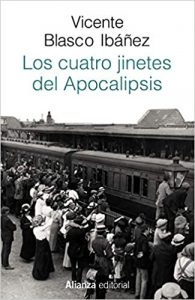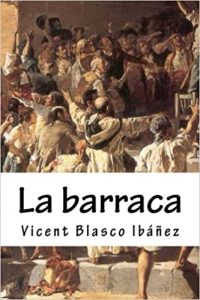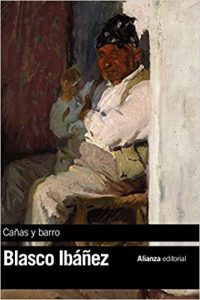The fall of the XNUMXth century and the dawn of the XNUMXth century found in Benito Pérez Galdós and in Vicente Blasco Ibáñez to two great narrators busy chronicling a time of nostalgia made into narration, of realism (especially in the case of Galdós) but also of an idealism in search of a story that is always traditional and close to the earth with pretensions of invitation to transformation; to the search for lost identities; to the vindication of what is popular despite the fatalism towards which historical circumstances led.
With close references of the generation of the 98, spearheaded in their most virulent dramatic manifestation in Inclán Valley, Blasco Ibáñez also embarked on a political career that led him towards the defense of a republic that he had nurtured since his childhood in its first establishment and that oriented him to a constant confrontation against everything that did not start from that republican ideal.
Perhaps because the issue of the republic never finished forging from his childhood days until after his death, Vicente Blasco Ibáñez moved around the world on a trip that served him to narrate exciting chronicles and to give testimony about the exotic nature of such disparate places he knew.
His literature (because in such an intense author one can speak of his own literature) weaves scenes and characters from his nearest Valencian land to many other places, always with a humanism without hot cloths, with that naturalism convinced of being necessary. A necessary testimony reconstructed in fiction about a world that official History always leaves buried., as roots of a necessary intrahistory.
Top 3 recommended books by Vicente Blasco Ibáñez
The four horsemen of the apocalypse
To know the history, you also have to read the story of each era. And Vicente Blasco Ibáñez wrote in this novel his subjective perspective, absolutely committed, on the shadows that had ended up enveloping a world plunged in the Great War.
When we read a history book we are offered the facts that we should believe and that, to be fair, on many occasions are limited to objective facts. The assassination of the Archduke as a gesture of total offense against the Austrian Empire, the Triple Entente and the Central Powers.
But it is really always more suggestive to approach such exalted characters as Desnoyers and Hartrott, each belonging to his side and plunged into the madness of having to kill each other despite their common family trunk.
The most certain facts of our civilization are the feelings and emotions narrated by those who lived them, and the impressions given by Blasco Ibáñez to these characters led to their worldwide recognition.
The barrack
I always had the memory, when I started reading this book, of the television series that was made for the novel. At the time it gave me the impression of being a series that did not advance, with a lot of Mediterranean light and many conversations from the natives of the area, some references to agricultural life and little else.
Many years later, when I read the book, I discovered how far we are from ourselves as time goes by. In that customs that seemed soporific to me as a child, I discovered the vertigo of a feather that takes you to the particular world of a calm Spain, absorbed in its obligation, devoted to misery and incapable of opening itself to the world.
Tragedy appears in this novel as a sensation of death announced between unapproachable passions and insurmountable conflicts.
Canes and clay
Thanks to the introspection of Blasco Ibáñez in his native Valencia, half of Spain was soaked in the salty flavor of a Levantine sea in which immortal characters like those in Cañas y Barro let us live their adventures in a magical lagoon.
Tonet represents a youth worn out by that fatalism inherited from disenchanted parents. The final decadence of the Dove clan outlined with a delicate sense of violence, moral decadence and revenge.
Los Palomas, a sacrificial family saga that had to send its last son Tonet to the war in Cuba will face the tragedy of passions that will end up splashing all the inhabitants of the place.




Rezension zu «Die vier Reiter der Apokalypse» (Anfang – den Rest würde ich Ihnen gerne per e-mail-Anhang zusenden – Adresse…?)
Mitten im Ersten Weltkrieg (1914) wurde dieses Buch in Paris geschrieben – ein spanischer Beitrag zur Kriegsverherrlichung, der zB in den USA zum Bestseller und bald auch verfilmt wurde. Keine Frage: Die Absicht des Autors, den preußischen Militarismus als den eigentlichen Kriegstreiber zu geißeln, ist aus heutiger wie aus damaliger Sicht berechtigt. Nicht aber die Absicht, pauschal zum Leitbild/Zerrbild einer ganzen Nation zu machen, dass alle nur «Tritte bekommen, die sie dann nach unten weitergeben wollen». Ganz anders natürlich die Widersacher dieser «mit Fußtritten erzogenen Kriegerhorde»: Da beschwört der Vater, als Zivilist gerade noch der Marneschlacht entkommen, seinen Sohn im bedrohten Paris, als dieser sich endlich auf seine kriegerischen Tugenden besinnt, dieser Krieg sei ja gar kein gewgenöhnlicher anständige Gegner, sondern eine «Jagd auf wilde Tiere». Und auf solche solle er ruhig schießen, denn: «Jeder, den du zu Boden streckst, bedeutet eine Gefahr weniger für die Menschheit.»